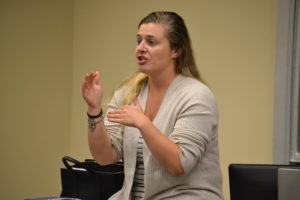By Michael Battista
Staff Writer
“You don’t know me.”
“There are barely any black or Hispanic teachers (at the College).”
“If I have dreads, I could have came from a family who really loves dreads… Why are you going to judge me because I have dreads?”
These comments were heard during Lambda Tau Omega’s “White Privilege” event on Monday, Oct. 4, in which attendees discussed the advantages of being white.
Dylilah Bryant, president of Lambda Tau Omega and a senior public health major, said she enjoyed how the event turned out and hopes more students will understand some of the issues that come with white privilege.
“It’s really hard to get people to actually come to these things,” Bryant said. “Especially when it says ‘White Privilege.’ Once again, it’s just something they’re avoiding the discussion of. And that’s our goal — to make it a discussion.”
The sorority welcomed sister and College alumna Caitlin Fair (’10) to talk about how white privilege has affected her and those around her.

“(My sorority sisters) wanted to do a workshop that they felt would be impactful to particularly the multicultural student body at TCNJ,” Fair said. “Talk about things that were important to college students today.”
As a Trenton native and teacher in that area, Fair told a story about one of her black students who came up to her car window in a known drug neighborhood.
“One of my kids was standing at my window talking to me about a football game he had just had,” Fair said. “A cop pulled up… and basically ran down on this kid and another kid who was on the other side of my car, asking them all these questions and just being really rough and I’m like, ‘Yo, this kid is 12.’”
During the talk, Fair discussed the perception of white privilege. She said some deny its existence entirely, while others say things like, “I don’t see color.” Most of those in attendance brought up personal experiences during the discussion, ranging from being singled out to instances of “whites wanting to be black.”
Bryant said that the sorority held the event because it wants to spread multiculturalism and empowerment.
“So, as far as white privilege… we feel like it’s (an issue) that needs to be discussed on this campus because it’s a predominantly white school,” Bryant said.
The College’s student body is mostly white. According to demographics from the Office of Admissions, 65 percent of the student population — 4,405 students — are white, while only about 6 percent — 378 students — are black. This doesn’t take into account students who identify as biracial or those who declined to report their race on their applications.
The College’s lack of diversity spurred some to attend the event, like sophomore business marketing major Sabrina McIntosh, who said she wants more students to understand how this issue affects everyone.
“I came to this event to be more informed about white privilege,” McIntosh said. “Knowing that I go to a predominantly white school, a lot of people here aren’t really informed. They know that white privilege exists, but they don’t necessarily believe they have it.”
Fair knows that this topic is difficult to convey to others. Some people only want to learn a little bit about racism before they give up or think it’s about white shame. There is also the issues of biases, which have been ingrained into people’s thinking over time and cannot be easily forgotten or overruled.
“The first part of the process of being able to unlearn things we’ve learned over the course of our lives is to want to unlearn those things,” Fair said.
The discussion topics hit home for many of those in attendance. McIntosh said she has felt as though others didn’t see her the same way because of her skin color and her choice of schools. She wanted more people to understand her and to be educated about white privilege.
“I’m a student that’s getting a scholarship from going here and people think I’m going here only because of my race,” McIntosh said. “Which is not a fact. I’ve worked just as hard as anyone else. My GPA is high… Just assuming I’m going to a predominantly white school because of my color is just something privileged people tend to say a lot.”
Bryant said while progress was made with the students who attended, there is still work to be done.
“This is an issue,” Bryant said. “This is something we should make more of a conversation instead of avoiding it ourselves.”






